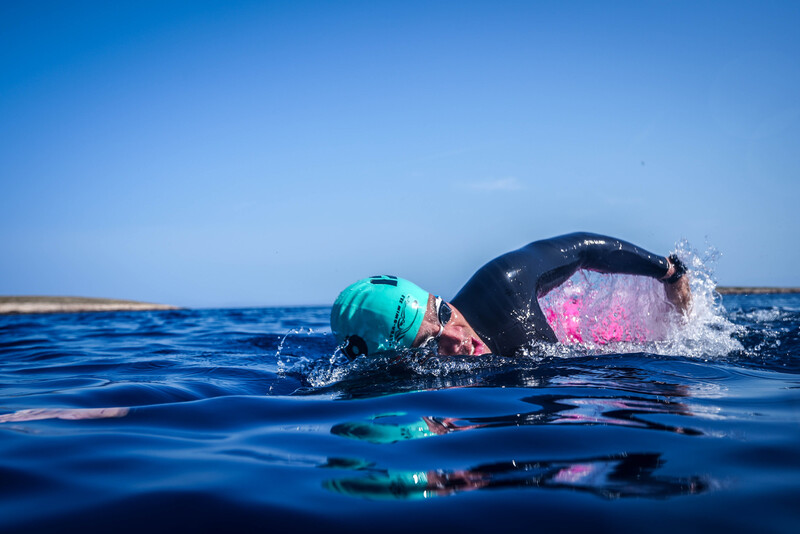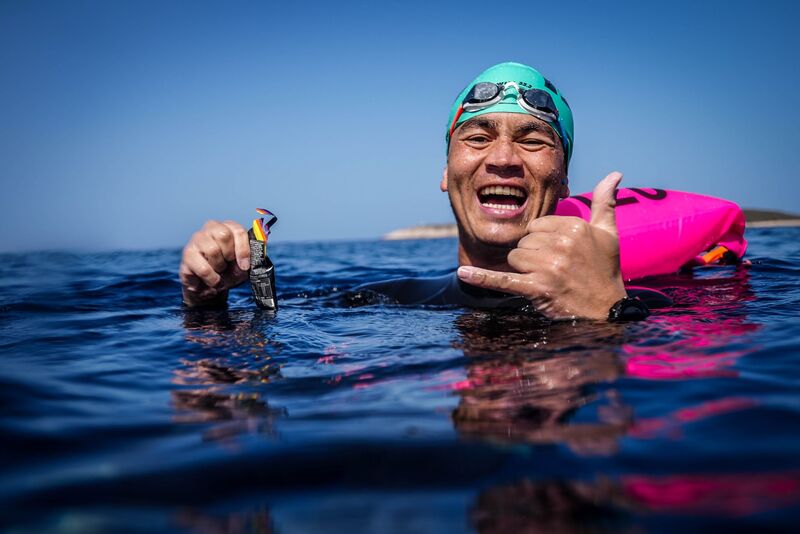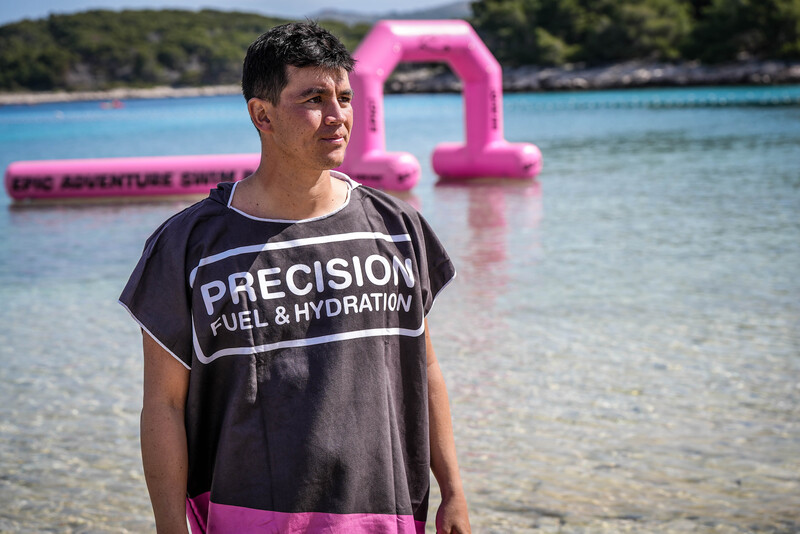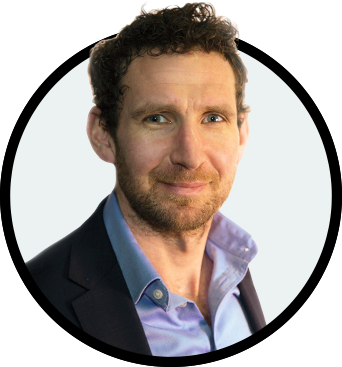Whatever paths Andy Donaldson takes in life, he’ll always be a swimmer. Broad shoulders. A streamlined body position. A catch and pull to maximise stroke length. An aerobic engine to hold 72 seconds for each 100 metres for hours on end. Some elements might eventually wither as the years take hold, but the mindset to endure won’t be one of them.
What has changed though is his environment. Where once the intense focus was on the black line at the bottom of the pool, the milliseconds on the clock, and mirage of Olympic glory, now it is the wonders of the open water world. From the English Channel to the Tsugaru Strait in Japan, he has completed the notorious Oceans Seven - seven of the world’s most famous crossings - in the fastest cumulative time ever, setting British and world records along the way, and all in under a year.
“I got into pool swimming as a kid in the west of Scotland. You would be considered mad if you swam in the ocean,” Donaldson explains from his home in Perth, where he’s lived since 2013.
“My older sister and cousin were in the swimming clubs and when you get dragged around to enough swim meets you follow in their footsteps.”
Donaldson excelled. His specialism was the 200m free and national age-group medals followed, but the sport also proved an unforgiving master.
“We all got flogged in the system growing up: big mileage, swimming twice a day before and after school. A lot of work in a cut-throat sport where your whole season is defined by two minutes of racing once a year, where you might get ill or just have an off-day, or get disqualified for taking a flier because there is so much pressure. It felt black and white. Success or failure. And everything based on results and times. If it didn’t go your way, it was hard to process.”
From burnout to record-breaker
“It instilled incredible qualities such as persistence, time management, goal-setting, working well with others and dealing with disappointment. But when I came out of the sport in my mid twenties having not achieved what I was capable of, I felt burnt out and not interested in going back. I was going to move on with life.”
By then, Donaldson had already moved much of his life to Western Australia. There was a family connection through his elder sister, a new country and culture to explore, the weather, of course, and the chance to study for a career as a chartered accountant that had been put on the backburner. Most importantly there was some life balance.
It was still a gradual transition. The identity he’d grown up with was hard to shake. The first year was spent chasing Commonwealth selection, with extra allure given the Games would be in Glasgow. The next two years, a fading Olympic dream. Donaldson had moved to the open water to target the marathon swim, which at 10 kilometres was 50 times further than his pool efforts. If that seemed a long way at the time, it’s barely a warm-up for where he is now.
The extra distance suited, but despite excelling in training and regularly beating his Australian counterpart, there was only one place available on the British marathon swim squad. With Indonesian heritage, he looked at the potential of switching allegiance, but it came to nothing.

“I felt I was in this place where I was trying to catch up on my career compared to colleagues who had come out of university and gone straight into work,” he continues. “Everything had taken a backseat to swimming, so I was now working long hours, coming home late and then reading a book on tax for another three hours.”
Contrasting with the engaged personality he is now, Donaldson withdrew. He all but stopped exercising and catching up with friends. Family visits would be restricted to the occasional coffee rather than quality time. In 2019, it came to a head.
“I had a relationship break down, things at work weren’t good, I lost a couple of friends to suicide, and it made me sit up and take stock of what I was doing,” he says. “Life hadn’t panned out how I thought it was going to. I hadn’t gone to the Olympics. I had these unfulfilled dreams. Yes, I lived in Australia, but I hadn’t seen much of the world. Once I completed my qualifications, I took a year out and decided to travel and figure out what I wanted to do.”
Donaldson quit his job, sold his bed on Gumtree and bought a one-way ticket. Where to? It didn’t really matter. There was no plan. “For the first time in my life, I didn’t have a structure. No competition. No exams. I could wake up each morning and decide: Where do I want to go?”
Thirty countries and several thousand miles later, a scuba diving qualification and a job as a volcano tour guide, Donaldson found himself in Nicaragua on the cusp of a pandemic. “The world was going through a crazy time. It was chaos and madness. They were locking down the borders and fortunately I managed to scramble my way back to Western Australia.”
Yet if the freedom of travelling had been cut short, the comparative incarceration of Perth provided unexpected serendipity. “It was like a fortress, we couldn’t leave the state, but we could exercise in the morning. The first day out of quarantine I headed to the beach and by pure chance the only parking spot available was next to an old friend and mentor of mine.”
For the love of open water
Firstly, he wanted to assure Donaldson that he’d been missed. Secondly, he wanted company for a swim along the coast and wouldn’t take no for an answer. Every morning during lockdown the pair would swim a couple of kilometres from Trigg Beach towards Sorrento and then back. “It was just the best. The sun would be coming up, conditions were beautiful, and I realised just how much I loved this sport, how much of a big part of my life it had been, and how much I had missed it.”
In truth, while the Covid environment threw a global spotlight on to the mental as well as physical wellbeing, Donaldson had already started tuning into its importance. “I was fortunate that I had good people around me when I was struggling the most and I sought help through counselling,” he says. “In some ways backpacking was a good distraction, but I recognised I was running away from life’s problems. Maybe there was a bit of shame that I hadn’t achieved my goals and let down the people who had believed and invested in me.”
“Perspective is key. People on the outside looking in may say I’ve had successes, but we can all be susceptible to not feeling like we’re good enough or comparing ourselves to others. Wanting more, instead of focusing on what we have. When I was younger, I didn’t have that maturity or awareness, but more life experience has shown me what success really is.

“It isn’t the results or records. They are nice, but it’s everything that goes into the journey. How I apply myself, respond to adversity, work with others and share experiences together. My ‘why’ before was results-oriented. To make teams. To be on the international stage. Not that I don’t think they are good reasons, but originally getting back in the water was for pure enjoyment, to stay healthy, because I love being immersed in the community and out in the ocean.”
Donaldson was still a racer at heart, but to return to racing would need not only a shift in mindset, but in training focus. Neither could he, nor did he want to, thrash himself up and down the pool again. Hard work would get him somewhere. Smart work would take him further.
Signing up to take part in the Rottnest Channel Swim, a 19.7km open water swim from Cottesloe Beach to Rottnest Island, he found himself up against swimmers in their early 20s who were on the national team. He knew he couldn’t out-train them, but looked at the areas he could make incremental improvements: nutrition, rest and recovery, more targeted gym work.
“We focused a lot on technique under duress,” he explains. Could I maintain my stroke rate when fatigued? Instead of massive mileage in the pool, I’d complete a gym session beforehand to tire the muscles and replicate the feeling of the second half of the swim. Or I’d race in the morning and then train in the afternoon for the same effect.”
There was also specificity. “If I wanted to race at 1:12 per 100m, I’d train at being able to swim 1:08 comfortably, so 1:12 felt like a doddle on race day.”
Aware that marathon swims over 10km are often tactical affairs, with the elite swimmers saving energy by drafting in one another’s wake before sprinting towards the finish, Donaldson wanted the pace to be uncomfortably high from the get-go, and ideally build an unassailable lead. At the 15km mark he had a 600m gap on the field that wasn’t for closing unless he bonked.
It had happened before. In 2018, and with little preparation, he had first been enticed into taking on the Rottnest swim. Two-thirds into the race that lack of training caught up with him. “I stupidly said yes with five weeks' notice and learned the hard way that’s not how you prepare for a channel swim,” he says. “That was my first experience of ultra marathon swimming. I had about 6km to go and was starting to swim vertically; legs stopping; arms feeling like lead. I was very naive.”
This time it was different
Donaldson won by seven minutes. A year prior he’d been partying in Nicaragua and sliding down the volcano scree. Now he was beating some of the best marathon swimmers in the world, covering half the distance in training they were. Something had changed.
“When I look back at my pro swimming career, I think there was a lack of belief that I could cut it on the international stage. When you don’t have that belief you don’t let yourself achieve it. I hadn’t performed when crunch-time came and that was a narrative I wanted to change. The Rottnest Channel swim was a turning point and the genesis of the Oceans Seven attempt. The core ingredient was belief.”
Donaldson had raised $12k for a local mental health charity through the swim. He’d set up a small coaching business to help adults learn the joys of the open water and Rottnest offered the chance to show people that it was never too late to pursue your goals.
“It resonated with people,” he continues. “People saw parallels with my mental health struggles and got behind it. It attracts over 2,000 swimmers every year and is a bit like the boat race in London where the whole city knows about it and gets behind it. And winning helps get the news out there.”

Donaldson’s mind started to go into overdrive. Having grown up in the UK, he was familiar with how the English Channel swim is termed the “holy grail” of marathon swimming, and knew that the swim from Dover to the French coast was just one of seven crossings that formed the daunting Oceans Seven.
“I remember reading about it years ago thinking: It’s friggin’ nuts!” Donaldson says. Conceived by former professional marathon swimmer and a renowned coach Steven Munatones in 2008, it incorporates the swims of the North Channel, Cook Strait, Molokaʻi Channel, English Channel, Catalina Channel, Tsugaru Strait and the Strait of Gibraltar.
Just 28 individuals have completed them all, most taking years. Donaldson hit on the idea to swim all seven within 12 months, trying to break as many records as he could along the way. The clock would again be ticking, but he’d quickly come to realise that times would just be a footnote in this adventure. Preparation would be vital, and yet controlling the elements would prove futile.
It was about to be the adventure of a lifetime.
In the second part of Tim Heming’s interview with Andy Donaldson, we’ll look at each Oceans Seven attempt in turn, as Donaldson recounts one of the most demanding endurance tests in the world.
